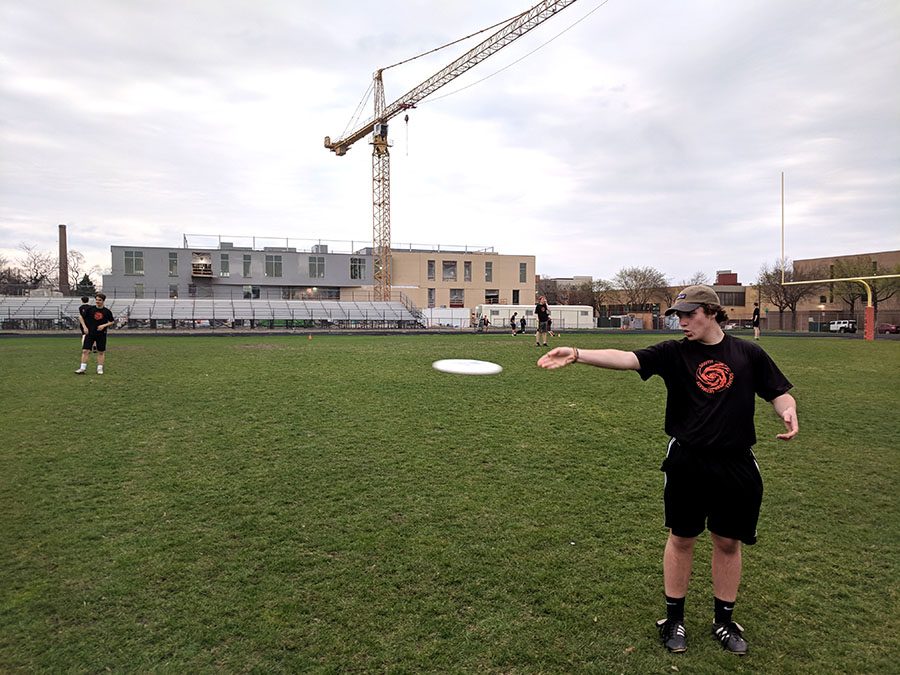Balling or brawling, aggression in sports
Ultimate frisbee stresses the importance of sportspersonship, “A lot of the sport pretty much works on social development and being nice to each other. It’s just a big part of it, like, good sportsmanship is taken semi-really-seriously,” said sophomore and JV ultimate captain Guthrie Paulson. Photo: Tannen Holt
May 11, 2018
The amount of aggression in sports is a topic that has been debated for decades. Is contact really something that is necessary to a sport? Do players focus too much on playing physical and hurting one another?
Some sports are known for their outright aggression and their tendency for violence. Others are known for their peacefulness, and the players’ integrity. But reputation aside, violence in all sports remains an occurrence, whether it is an everyday occasion or a rare outlier.
Sophomore Gavin Schultz is hockey player, and has been since he was six. While he considers hockey an aggressive sport, he doesn’t consider the violence that comes with the intensity of the game as a problem. He says it depends on the type of person who’s playing.
“Part of the [violence] is kids checking, playing for the puck; and then you have kids just being kids. I don’t really see a problem with it though. Most of the time it’s verbal: name calling and stuff. Sometimes they get into it physically though.”
Schultz claims that while he sees where the aggression could turn into a problem, he sees it as a valuable component to the game. But he definitely agrees there’s a line that can be and sometimes is crossed.
“I think it can lead to a problem,” He said. “People could be aggressive in sports, and then think it’s ok [to act that way] in real life. But I think most kids don’t have that mindset, but it could be a problem with kids who have [mental illnesses].”
But what line is that? Schultz says he accepts smack talking (or “chirping” as hockey players call it), some physical altercation, but when does it get overboard? Behavior in the game can cross over into outside conflict, which is exactly what Junior Claire Bentfield experienced in 2014 when the Roosevelt Girls Basketball team jumped them outside of South.
“We really beat them badly, 60 to 0 or something. [The officials] made us go out the back door, because [a brawl] has happened in the past and they made us go out back so hopefully it wouldn’t happen, but they were out there waiting for us,” she told me. “They all had out their phones and were all like ‘F*ck you, you suck’ or whatever, while we were trying to get on the bus. That was when people started getting jumped.”
It seems crazy to think that a high school sport would lead to a brawl. After all, most kids who play school sports do it either for fun, or because they want to pursue it in college or later in life. For that to be fun would be borderline sadism, and being a sore loser isn’t something college scouts look for.
“Three of us got [jumped], and [Roosevelt players] just start beating on them. Our coach just comes out, and he has no idea what to do. Finally everyone gets on the bus, we start rolling up the windows and the other team starts yelling ‘we’re gonna come to South and come beat you up,’ and eventually all the girls’ boyfriends start trying to attack us. And then [Claire’s sister] says that there were people at South when [her family] came to pick me up and then the cops came.”
Perhaps the answer to this influx of aggression lies with one of the more recently popularized games; which, despite its lack of referees or officials has little to no cases of players lashing out at one another. A sport whose players’ dedication to the game and integrity goes above and beyond the normal dedication to a sport. That’s right, ultimate Frisbee.
“Everyone is super chill,” said Guthrie Paulson, the 10th grade captain of the JV boys Squall team. “A lot of the sport pretty much works on social development and being nice to each other. It’s just a big part of it. Good sportsmanship is taken semi-really-seriously.”
Even sports that have referees and penalties deal with players misbehaving and acting out at other players, teammates, coaches, and spectators somewhat frequently. But for a sport with no authority present in the game, ultimate frisbee players have an incredible amount of honesty and coolness. Ultimate sets the precedent that treating the other team with respect is something that is essential as a part of the game.
Good sportspersonship is even specifically included in official rules of ultimate. According to usaultimate.org, “Highly competitive play is encouraged, but never at the expense of mutual respect among competitors, adherence to the agreed upon rules, or the basic joy of play.” Ultimate even goes further by encouraging teams to give”Spirit Awards” to a member of the other team who they deemed displayed extraordinary sportspersonship.
“If there’s a foul, the player has to call it, then we pretty much just have a conversation. It makes you have to be a good person, and not a lier or a cheater, because people will call you out. I think a lot of the time [in other sports], since there’s just a ref, and you foul someone, you just get a penalty for like three minutes and then you don’t have any other consequences,” said Paulson.






